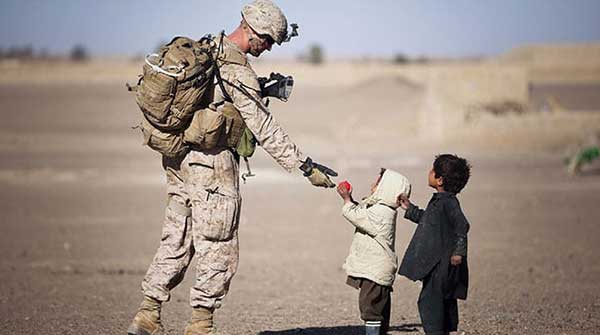 Since the end of the Cold War, there has been almost endless war and genocide.
Since the end of the Cold War, there has been almost endless war and genocide.
This century has seen Afghanistan and Iraq torn apart by violence. We’ve watched the greatest humanitarian crisis in the world continue in Yemen year after year, and we’ve yet to see an end to the conflicts in Syria and the Democratic Republic of the Congo.
Over 80 million people are displaced by armed conflict, and now we have the Russian invasion of Ukraine.
Even worse, this is far from a comprehensive list of hostilities in our world today.
The only beneficiaries of these conflicts are the purveyors of the military-industrial complex. They carry undue influence in our governments and use mass media to convince us that what they’re doing is necessary and even good.
The rest of us send money to help the suffering through Doctors Without Borders, the Red Cross, the UN High Commission for Refugees and many other worthwhile organizations. But is that all we can do?
I grew up during the Cold War. Many of my peers thought the world would end, and we came very close to proving them correct. I clung desperately to hope. How could one look at the face of a child and still believe that omnicide ( the total extinction of the human species) was the destiny of humanity?
As a Catholic, I heard stories of the mother of Jesus appearing in several parts of the world promising peace and asking people to pray. What did I have to lose by adopting the prayer she suggested, the rosary, into my daily routine?
A rosary is a circular string of prayer beads. One holds it while saying the Our Father and the Hail Mary multiple times, and this is how one prays the rosary.
Perhaps I’m being duped by confirmation bias but following this advice really seemed to make a difference.
In 1986, I was in my first year of teaching in a Catholic elementary school. We were completing a unit in Social Studies on the Philippines, where I had spent a year studying. One morning, I heard on the news that the American-backed dictator, Ferdinand Marcos, was sending heavily armed troops into the streets to disperse the people who were demanding that he respect the democratic process in their country.
Upon arriving at school, I reported the crisis to my students and added, “I don’t know what’s going to happen, but today, for Religion class, we’re going to pray the rosary for peace in the Philippines.”
At the time, people in that country were walking the streets with their rosaries, handing flowers to soldiers. Within hours, Marcos and his wife Imelda were on an American jet to Hawaii, and the people’s choice, Corazon Aquino, was hailed the new president of the Philippines.
During the Cold War, Catholics embraced the rosary on both sides of the Iron Curtain. It proved to be a powerful force of unity. This became especially clear when Pope John Paul II visited his native Poland in the 1980s. It wasn’t long until people all over Eastern Europe were participating in peaceful marches and, by the end of the decade, the Berlin Wall was open.
I don’t believe it matters what religious tradition one chooses to follow, or even if one chooses to follow any religion. When we embrace the sacred humanity of ourselves and one another, borders no longer matter and sworn enemies become dear friends. The rosary is simply one means to this end.
The powerful may try to convince us to hate and kill, but I’ve never known that to be an effective strategy for peace.
The ultimate truth is that a divine being loves each of us and simply asks us to love and care for one another. Embracing this principle is the greatest hope for humanity.
Gerry Chidiac specializes in languages, genocide studies and works with at-risk students. He is the recipient of an award from the Vancouver Holocaust Education Centre for excellence in teaching about the Holocaust. For interview requests, click here.
The opinions expressed by our columnists and contributors are theirs alone and do not inherently or expressly reflect the views of our publication.
© Troy Media
Troy Media is an editorial content provider to media outlets and its own hosted community news outlets across Canada.


